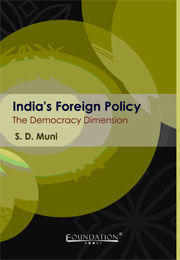Book contents
- Frontmatter
- Contents
- Preface
- 1 Introduction
- 2 The Nehruvian Phase: Ideology Adjusts with Realpolitik
- 3 Nehru's Successors: Realism Takes Command
- 4 Imperatives of the New Millennium
- 5 An Overview
- Appendix I Warsaw Declaration on Community of Democracies, June 2000
- Appendix II Santiago Commitment; Community of Democracies, April 2005
- Appendix III PM's Address to Joint Session of the US Congress, July 2005
- Appendix IV PM's Speech at the Foundation Stone Laying Ceremony of Afghan Parliament, August 2005
- Appendix V PM's Speech at the UN Democracy Fund, September 2005
- Appendix VI PM's Speech at the Conference on Democracy, Development and Social Inclusion, December 2005
- Index
Appendix III - PM's Address to Joint Session of the US Congress, July 2005
Published online by Cambridge University Press: 26 October 2011
- Frontmatter
- Contents
- Preface
- 1 Introduction
- 2 The Nehruvian Phase: Ideology Adjusts with Realpolitik
- 3 Nehru's Successors: Realism Takes Command
- 4 Imperatives of the New Millennium
- 5 An Overview
- Appendix I Warsaw Declaration on Community of Democracies, June 2000
- Appendix II Santiago Commitment; Community of Democracies, April 2005
- Appendix III PM's Address to Joint Session of the US Congress, July 2005
- Appendix IV PM's Speech at the Foundation Stone Laying Ceremony of Afghan Parliament, August 2005
- Appendix V PM's Speech at the UN Democracy Fund, September 2005
- Appendix VI PM's Speech at the Conference on Democracy, Development and Social Inclusion, December 2005
- Index
Summary
Mr. Speaker,
Mr. Vice President,
Distinguished members of the US Congress,
Ladies and Gentlemen,
I deem it a privilege to be invited to address this Joint Session of the US Congress. I thank you for the invitation. I bring you the greetings and good wishes of the people of India.
India and the United States have much in common that is very important to both countries. You are the world's oldest democracy, we are its largest. Our shared commitment to democratic values and processes has been a bond that has helped us transcend differences. We admire the creativity and enterprise of the American people, the excellence of your institutions of learning, the openness of the economy, and your ready embrace of diversity. These have attracted the brightest young minds from India, creating a bridge of understanding that transcends both distance and difference between us. In addition to the values we share as democracies, there is also a convergence in our perceptions of a rapidly transforming global environment, bringing us much closer together than at any time in the past.
Globalization has made the world so inter dependent that none of us can ignore what happens elsewhere. Peace and prosperity are more indivisible than ever before in human history. As democracies, we must work together to create a world in which democracies can flourish. This is particularly important because we are today faced with new threats such as terrorism, to which democracies are particularly vulnerable.
- Type
- Chapter
- Information
- India's Foreign PolicyThe Democracy Dimension, pp. 157 - 165Publisher: Foundation BooksPrint publication year: 2009



